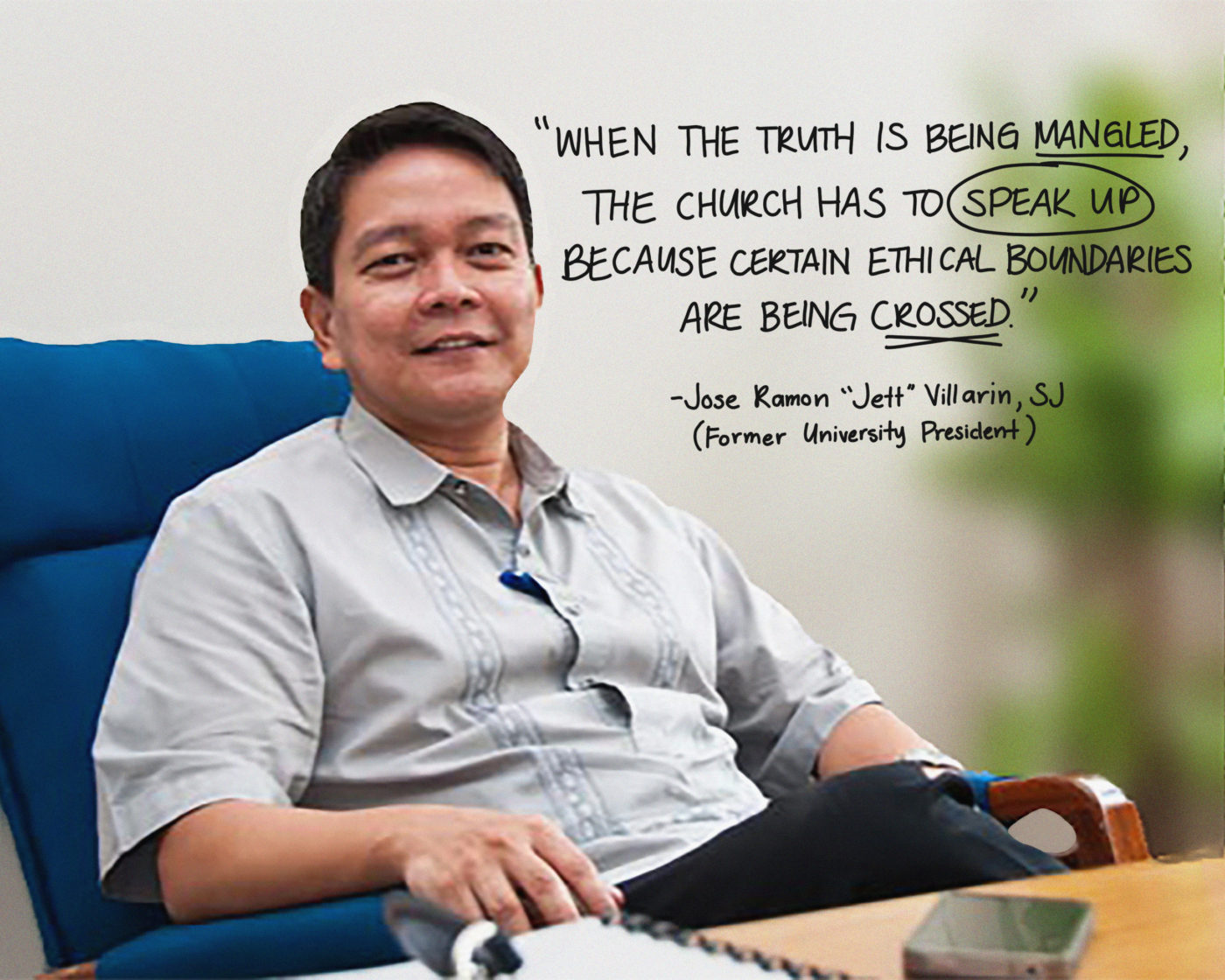CATECHISM STORIES shared in theology class are tales as old as time. Recursively taught every year as students climb up the educational ladder, these proclamations on doctrine, morals, and worship are taught as integral, immoveable lessons on everyday life. In turn, students absorb these religious ideas as “cold facts.”
However, the relevance of religious education has begun to wane in recent decades. As the increasingly progressive generation leads the way in introducing more secular ideas in the University, theology classes buckle in standing the test of time.
Due to the preoccupation of religion courses with complex religious doctrines, students now question how religion offers much practical use—especially in navigating the deep moral outrage incited by the upcoming elections.
Sign of the times
Devout Christian Lorraine Joy Bales (2 BS PSY) has long valued the irreplaceable role of religion in her life. She begins her days in prayer with God, who has been with her during her darkest moments.
Honoring a lesson she learned from her youth ministry, Bales believes that the Church’s teachings should not be separated from politics to successfully live out God’s commandments. This is partly why she found the Ateneo’s Jesuit education particularly fulfilling.
The Ateneo’s Jesuit education plays a major role in the social transformation of its students. True enough, Bales views classes on religion and faith as vital in forming students’ political identities since they foster moral and intellectual virtues aimed to promote the common good.
Going beyond religious truths and concepts, Bales maintains that the Ateneo’s Theology classes helped her become more vocal about different social issues. Imbued with the virtues of the common good, Bales chose to become a vocal supporter of presidential aspirant Vice President Leni Robredo and has also joined a Robredo caravan and campaign rally.
While students like Bales see the value of religion classes, translating this appreciation into actual student participation remains a challenge for these courses. Bales shares that she only sees less than half the class in synchronous sessions every week.
Aside from religious institutions, churches are also confronted with the challenge of engaging Catholic adherents. In a predominantly Catholic country, the status quo of religious education instills the truths about doctrine that has only turned away young believers. Centered on the importance of religious facts such as doctrine, the current system ironically fosters the opposite of the very definition of Theology: Faith-seeking understanding.
Former University President Jose Ramon “Jett” Villarin, SJ agrees with this diagnosis and warns against the implications of a Church that alienates its own people.
“The Church has been complicit and slow to change. So, there’s been efforts to better understand where people are coming from and this alienation of young people [away from] religion,” he laments.
As the Jesuit education’s primary goal is to form the whole person, Villarin states that Theology should not be taught as detached catechism. Instead, Theology classes should confront why people are disenchanted with religion and why they feel alienated even if they are spiritual.
By operating on the personal level, theology can come alive. People are moved by the stories taught in classes—so much so that they arrive at the big answers to their faith.
Shedding light
Amid the political turmoil that the country is plunged into, the fundamental concepts of morality and conscience underscored by theology courses extend beyond the classroom’s confines. Thus, these courses provide a framework that pushes students to fathom the complexities of life using the human faculties of reason and conscience.
“Religion gives you a worldview that’s based on a truth of life,” Theology Professor Raoul Dominic Roncal says.
As questions of justice and truth arise in today’s political climate, Roncal says that theology articulates the Catholic Social Teaching that is centered on the preservation of human dignity and pursuit of the common good. It strives to enrich students’ understanding of their faith and the truth to push them to break free from a self-centered perception and assess how they can serve society.
Similarly, Philosophy professors train students to think critically, holistically, and with the perspective of the transcendent, viewing the self as a fraction of a greater whole.
“What we teach in philosophy and theology is a discipline of thinking where you have a sense of openness to reality, and the capacity to understand that [phenomena] that present themselves to you have a deeper meaning,” says Philosophy Professor Agustin Rodriguez.
Thus, the Ateneo’s religious education aims to orient and not indoctrinate Ateneans in having a “deeper grounding” of phenomenon, Rodriguez shares. An understanding of the truths of life will animate them to work for the common good. This effectively resolves the tension of how Filipinos detach morality and spirituality from political realities because they see politics as a mere transaction, Rodriguez elaborates.
Bales affirms this through her own classroom experiences: “I think the Ateneo educates us, the students, to be really politically engaged and active in response to the crisis and to the issues confronting our society today, especially through the lens or through the prism of Catholic Social Teaching.”
Taking a stand
Asserting the significant role of religion in politics, Ateneo Theologians, Philosophy professors, and individual Jesuits recently released their endorsement of the Leni Robredo-Kiko Pangilinan tandem—also stirring up conversations on the separation of Church and state.
In response, Villarin debunks the myths about this contested legal concept. He says that the separation of Church and state only refers to the ability of any citizen to freely practice any religion without restrictions by a state-mandated religion. Thus, the concept has nothing to do with hindering religious people from speaking about political matters.
Despite the difficult balance between taking a stand and potentially alienating “their flock,” Villarin reinforces the importance of having the Church engage with political issues.
“Politics is concerned with the common good. If you have a leader who divides people, then that ends up in murder and injustice,” he says.
Villarin also reminds of religion’s crucial role in political action as exemplified through the undeniable impact of Jesuits and religious figures during the Martial Law era. Under a government that restricted free speech and oppressed any form of dissent, the Church stood alongside other non-governmental organizations and people’s groups for society’s right to truth and human dignity. By mobilizing the underground dissemination of the news, the Church equipped society with the means and information to criticize the injustices of their administration.
Today, religious institutions play an undeniably similar role in combating the dissemination of dishonesty in mainstream media. “When the truth is being mangled, the Church has to speak up because certain ethical boundaries are being crossed,” Villarin emphasizes.
Keeping the faith
To encourage participation among students in theology classes, Rodriguez reminds instructors to remember the goal of teaching Philosophy courses.
He explains,“We don’t teach them about their spirituality and their religion. We teach them how to think about it critically and philosophically, in the hope, of course, of it serving they’re becoming better human beings.”
With the current proliferation of disinformation and historical revisionism, Roncal thus highlights how a vote in the May polls is not just a political choice but also a moral one. He challenges voters, “The political realm has entered the moral landscape… and what’s the moral landscape? It’s about right and wrong.”
“If we really are true and sincere in our faith, that will be expressed and manifested in our choices and our behavior, especially in the votes that we will pass in the upcoming May 2022 Elections,” Bales reminds LS students, asserting the inescapable reality that the religious will always be political.







